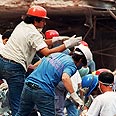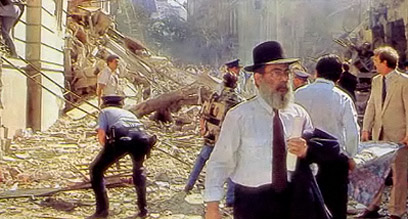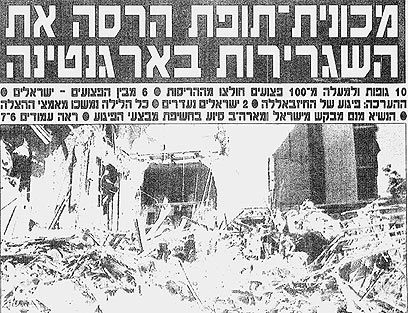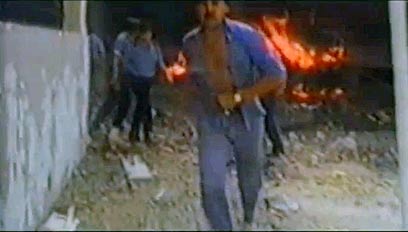
'I didn't let the Iranians win'
Bereaved families, survivors of blast at Israeli embassy in Argentina return to site of attack two decades later
Surrounded by dozens of police officers and guards, our delegation members step off the bus on Calle Arroyo and begin marching down the street towards the spot where Israel's embassy once stood.
"I'm not feeling well," Raheli Shefi whispers in my ear. "It's difficult to be here."
Related articles:
- Ayalon: Iran terrorists could be plotting next attack Terror wave: Iran seeks grand revenge
- Op-ed: Iran’s price tag policy
Her husband, Yitzhak Shefi, is walking a few paces behind us, his face emotionless. Twenty years ago, when he was the Israeli ambassador to Argentina, he called Buenos Aires his home. But he hasn't stepped foot in the country since he completed his diplomatic mission there.
"When I arrived at the embassy that day, the place looked like a battle field," he recalls. "The noise was terrifying; sirens, screaming, shattering glass. It was hell on earth."
The fateful day
It happened on March 17, 1992. A terrorist parked a car bomb near the entrance of the Israeli embassy's compound, then located on Calle Arroyo 910 in the Argentine capital. At 2:50 pm, the bomb exploded, causing the building to collapse, leaving 29 dead and injuring dozens – diplomats, neighbors and passersby. Four Foreign Ministry employees were among the deceased – David Ben Rafael, Eli Ben Zeev, Eliora Carmon and Zehava Zehavi.

'We didn't realize magnitude of event at first.'
"In the first moments after the blast, no one perceived the magnitude of the event," says Noam Sahar, a former embassy guard who survived the ordeal. "Only when we managed to get out did we understand the severity of the disaster. A building that stood in place for 42 years just disappeared."
Exactly two decades later, to the minute, a memorial siren breaks the silence at Israel Embassy Square. Curious residents peek out of their windows. On a stage, Argentine officials who arrived for the memorial ceremony observe a moment of silence. Israel's Deputy Foreign Minister Daniel Ayalon stands nearby.
Meanwhile, Miri Ben Zeev lays a wreath near a stone wall – a stalwart remnant of the embassy building. Her husband, Eli, was an embassy security officer.
"I got there that day after a friend called me and told me there was an explosion at the embassy," Miri recounts. "I remember the guys standing on the ruins, searching for survivors. One of the local staff members told me that he saw Eli walking around. Three days passed before his body was found under the rabble."

Headline: 'Car bomb destroys Israeli embassy in Argentina'
I meet Danny Carmon on a hotel rooftop. The city is the backdrop for our conversation – a wonderful, terrible city, as he defines it. Carmon, a veteran diplomat who in 1992 served as the Israeli consul, lost his wife that day – Liora, who worked at the embassy as well. He was injured in the blast, but survived. He was left to raise their five young children alone.
"It was a completely different life," he says. "It was a sharp transition."
This year, his entire family accompanied him on the trip – including his granddaughter and current wife.
"This is the bereaved families' journey to the place where they lost someone or something," Carmon notes. "This important Foreign Ministry initiative holds great significance for us as a family, and for Israeli diplomacy in general.
"After all, we all know that those responsible for that terrible terror attack are the same people responsible for the recent attempts to harm Israeli diplomats abroad."

29 were killed in blast
A special report compiled by the Mossad, the CIA and the Argentine intelligence service asserted a few years ago that Iran was behind the 1992 attack, as well as another blast that targeted a Jewish community center in the same city two years later, killing 89 and injuring hundreds.
'I didn't let the Iranians win'
When the night falls and I arrive at the memorial rally organized by local Jewish youth movements, I realize that despite the decades that have passed, anger persists. The generation that was not yet born when the scarring event transpired is left to demand justice.
"None of the terrorists responsible for the attack have been apprehended over the past 20 years," one of the guides tells me. "The Argentine government in the 1990s was corrupt, it buried the investigation. We still demand to bring the loathsome people who perpetrated the attack to justice."
Elisa Ben Refael wants justice as well, but she considers herself triumphant in light of the challenges she has overcome.
"It's a thousand times harder to raise kids without their father," she says, referring to the loss of her husband, David, who served as deputy chief of mission at the embassy. "It was really tough, but that's good, because I succeeded. I didn't give up. I didn't give the Iranians the victory that they sought."
- Receive Ynetnews updates directly to your desktop










